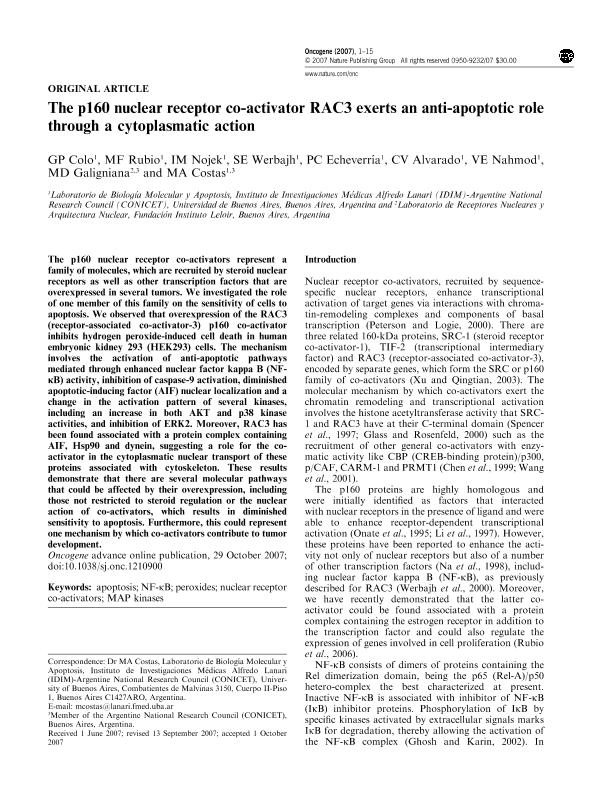Artículo
The p160 nuclear receptor co-activator RAC3 exerts an anti-apoptotic role through a cytoplasmatic action
Colo, Georgina Pamela ; Rubio, María Fernanda
; Rubio, María Fernanda ; Nojek Barbieri, Ignacio Martin
; Nojek Barbieri, Ignacio Martin ; Werbajh, Santiago Enrique
; Werbajh, Santiago Enrique ; Echeverria, Pablo Christian
; Echeverria, Pablo Christian ; Alvarado, Cecilia Viviana
; Alvarado, Cecilia Viviana ; Nahmod, Victor Elias; Galigniana, Mario Daniel
; Nahmod, Victor Elias; Galigniana, Mario Daniel ; Costas, Monica Alejandra
; Costas, Monica Alejandra
 ; Rubio, María Fernanda
; Rubio, María Fernanda ; Nojek Barbieri, Ignacio Martin
; Nojek Barbieri, Ignacio Martin ; Werbajh, Santiago Enrique
; Werbajh, Santiago Enrique ; Echeverria, Pablo Christian
; Echeverria, Pablo Christian ; Alvarado, Cecilia Viviana
; Alvarado, Cecilia Viviana ; Nahmod, Victor Elias; Galigniana, Mario Daniel
; Nahmod, Victor Elias; Galigniana, Mario Daniel ; Costas, Monica Alejandra
; Costas, Monica Alejandra
Fecha de publicación:
10/2007
Editorial:
Nature Publishing Group
Revista:
Oncogene
ISSN:
0950-9232
Idioma:
Inglés
Tipo de recurso:
Artículo publicado
Clasificación temática:
Resumen
The p160 nuclear receptor coactivators represent a family of molecules, which are recruited by steroid nuclear receptors as well as other transcription factors that are over-expressed in several tumors. We investigated the role of one member of this family on the sensitivity of cells to apoptosis. We observed that over-expression of the RAC3 p160 coactivator inhibits hydrogen peroxide-induced cell death in HEK293 cells. The mechanism involves the activation of anti-apoptotic pathways mediated through enhanced NF-kB activity, inhibition of caspase-9 activation, diminished AIF nuclear localization and the change in the activation pattern of several kinases, including the increase in both AKT and p38 kinases activities, and inhibition of ERK2. Moreover, RAC3 has been found associated to a protein complex containing AIF, Hsp90 and dynein, suggesting a role for the coactivator in the cytoplasmatic-nuclear-transport of these proteins associated to cytoskeleton. These results demonstrate that there are several molecular pathways that could be affected by their over-expression, including those not restricted to steroid regulation or the nuclear action of coactivators, which results in diminished sensitivity to apoptosis. Furthermore, this could represent one mechanism by which coactivators contribute to tumor development.
Palabras clave:
APOPTOSIS
,
RAC3
,
COACTIVADORES
,
NF-KB
Archivos asociados
Licencia
Identificadores
Colecciones
Articulos(IDIM)
Articulos de INST.DE INVEST.MEDICAS
Articulos de INST.DE INVEST.MEDICAS
Citación
Colo, Georgina Pamela; Rubio, María Fernanda; Nojek Barbieri, Ignacio Martin; Werbajh, Santiago Enrique; Echeverria, Pablo Christian; et al.; The p160 nuclear receptor co-activator RAC3 exerts an anti-apoptotic role through a cytoplasmatic action; Nature Publishing Group; Oncogene; 27; 17; 10-2007; 2430-2444
Compartir
Altmétricas



